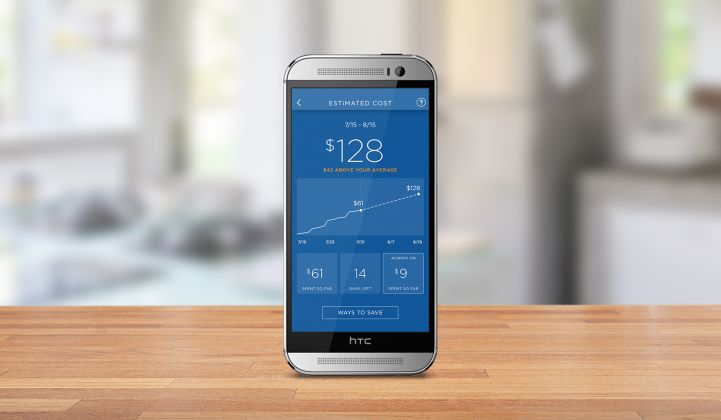RWE, Germany's second-biggest utility, announced in December it would roll all of its renewable energy assets, retail services and grid modernization projects into a new public entity in an effort to focus more on "decentralization and digitization."
The month before that announcement, RWE was one of the investors in Bidgely’s $16 million Series B. RWE is now the first European utility to widely roll out the California startup's new HomeBeat mobile app to millions of customers.
Bidgely has developed disaggregation software offering customers appliance-level energy consumption data, which it collects by analyzing the unique energy-use patterns of individual devices.
Bidgely is the sort of technology that fits in with RWE's vision of operating as a provider of energy services and home services. “Together we can introduce and monetize new future-oriented products and services for the sake of our customers, making the difference compared to our competitors,” RWE CEO Peter Terium said in a statement.
RWE is now looking for many more startups that fit into that vision. RWE has announced it will build a strategic venture capital fund with a cap of $144 million. The funds will support businesses identified by RWE’s New Ventures innovation division, which is based in Silicon Valley.
“There are many clever startups prepared to crunch the numbers for anything you may need, but we have the customers -- all 23 million of them -- and we know what they want,” said Terium.
RWE has also invested in behind-the-meter energy storage startup Stem and partnered with KnGrid for electric-vehicle charging. RWE will not just be investing in individual companies. While it builds its venture fund, it will also invest $15 million into an existing venture fund that focuses on green technologies.
For RWE, it’s all about staying competitive as an energy retailer and morphing into an energy and home service provider. RWE has millions of customers, but it can’t offer them all the same services because of different grid technologies and policies in various countries.
For instance, only a fraction of RWE customers will get Bidgely’s technology right away given the patchy rollout of smart meters in Europe. In Germany, RWE expects to roll out about 100,000 smart meters per year at least, but that could scale up to 500,000 per year if the government decides smart meters need to be installed faster.
Bidgely’s mobile app will be offered sooner to RWE customers in the U.K. and the Netherlands, both of which have already implemented smart meters to large portions of the population.
The app leverages Bidgely’s core disaggregation technology to tell customers whether they’ve left an appliance on, such as an electric stove or air conditioner. Bidgely is best known for its disaggregation software offering customers appliance-level energy consumption data, which it collects by analyzing the unique energy-use patterns of individual devices.
It can also offer comparisons on how much energy a house is using for specific appliances compared to similar households. “We’re taking the app from disaggregation to engagement and performance,” said Abhay Gupta, CEO of Bidgely.
But some of the most-used functionalities could just be bill alerts and notifications. Stefan Padberg, head of innovation and cooperation at RWE New Ventures, said that customers in Germany may only get a bill once a year, so providing information in near-real time would be an immense upgrade.
What most people want, however, is peace of mind. RWE already offers smart home services in Germany such as security cameras and connected lighting. About 80 percent of RWE customers said they were willing to pay for value-add services around security.
To test that hypothesis, RWE is piloting various payment options, from free all the way up to $10 per month. At the higher end, RWE is offering guarantees that the utility bill savings from the technology will cover the monthly cost of the service.
In the future, the app may help RWE and other utility customers in deregulated regions set a cap on their electricity costs and then let their energy services provider find ways to help them stay within the target.
E.ON was also an investor in Bidgely’s Series B, although there has not been news of E.ON moving beyond pilots with Bidgely yet. The California startup is also working with Texas retailer TXU, which is offering HomeBeat to its 1.5 million residential customers.
It’s not just retailers who are interested. Commonwealth Edison, which is in the midst of a smart meter rollout, will also be using the HomeBeat mobile app for its customers. Exelon’s Constellation Technology Ventures led the Series B. Exelon also owns ComEd.
Bidgely's technology is mostly used by utility clients that have already deployed smart meters, but Gupta has said it can also offer analytics based on monthly data -- although it does not have the same level of granularity in that domain compared to what the company can do with smart meters.
“We support all kinds of data streams,” he said. By working with utilities no matter where they may be in terms of smart meter technology, Bidgely is hoping to grab an increasing portion of the consumer engagement business not only in North America, but also in Europe and Australia.



